ATHENA
Goddess of Wisdom
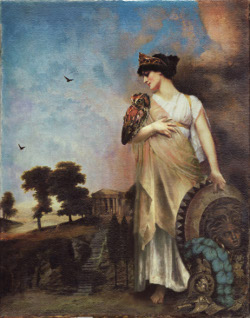 Read More
Read MoreLong ago she was also the Goddess of war and weaving, but these are obsolete on Arcadia. Now this Olympian is the guardian of the knowledge of the ages. Her personal archive contains one copy of every book ever written on Arcadia and most of the greatest works of ancient Earth. Athena cannot bring herself to destroy the writings of men, even when they contradict the teachings of the Olympians. So to keep dangerous knowledge from the general population, the most sensitive books are written in the dead language of Latin - which only a handful of the scholarly elite of New Athens can read.
The capital of the Athena sect is New Athens. It boasts massive modern skyscrapers and well tended ornamental gardens. The Academy educates the elite of Arcadia and affirms the ancient Earth saying: Knowledge is power.
Followers of Athena tend to be philosophers, teachers, historians and scholars. They love reading, writing, debating, and thinking. Most citizens in New Athens strive to learn something new each day, which is why their city is filled with libraries, lecture halls and museums. In their early twenties followers of Athena take a personality profile that helps them logically select potential spouses. Compatibility is more important than passion in Athenian families. At the age of ten young Athenians move away from their parents to attend The Academy.
HERA
Mother of the Amazons
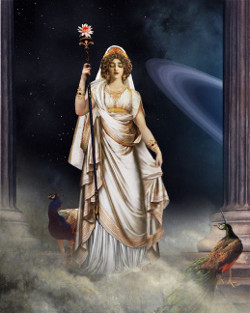 Read More
Read MoreShe provides her sect of female warriors with strength and independence, but the price is high. At the age of 10, every Amazon makes an Oath to Hera to forsake the male of the species and remain true to her Amazon sisters until the day she dies. To break this vow is to face the wrath of Hera and the entire Amazon nation. Of course men are allowed in Amazonia once a year to participate in the Great Hunt in order to help the Amazons with their reproductive needs.
The capital city of the Hera sect is Amazonia - a forest filled with ancient trees and a labyrinth of shrubs and flowers in every color of the rainbow. The simple stone and wooden buildings are simply one part of the beautiful mosaic of nature.
Amazons train from an early age to fight and hunt. They are pragmatic and will learn any skills or trade necessary for survival and the advancement of the Amazon nation. Most Amazons spend at least part of the day swimming, hunting, or exercising. They enjoy outdoor sports and are very competitive. Families consist of a mother and daughters only. (Male children are left at the orphanages in the Demeter sect and the boys usually become Sons of the Earth and grow up to work in the fields.)
APHRODITE
Goddess of Love & Beauty
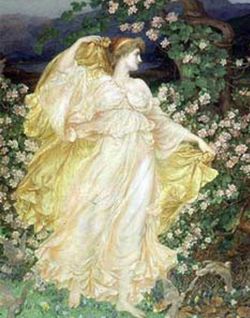 Read More
Read MoreThe followers of Aphrodite are lovers of beauty. Many live in the temple complex with the Goddess herself, while others are artisans of the highest skill. Craftsmen among the followers of Aphrodite create clothing, jewelry, and leatherwork with intricate designs and workmanship unrivaled anywhere on Arcadia. Pride in one’s appearance is a common trait of followers of Aphrodite.
A noble citizen of New Corinth might spend hours in preparation for a banquet with the Goddess so that every aspect of their clothes, hair, and make-up is perfect. Aphrodite has been know to enhance the appearance of her followers and even slow the aging process for her favorites.
Aphrodite’s followers in New Corinth have a unique practice called triagamy where three adults form the backbone of a family unit. All three adults are considered the parents of any children in the family no matter who the biological parent actually was. All marriages in New Corinth must have the blessing of Aphrodite.
POSEIDON
God of the Sea
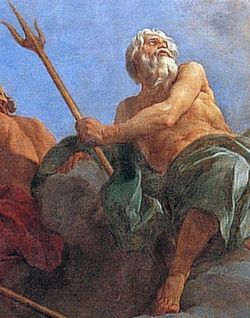 Read More
Read MoreMost of the followers of Poseidon live in an underwater city called Atlantis. They are isolationists who have no contact with the other sects of Arcadia, so very little is known about them.
Fun fact, legend says that Poseidon invented the horse.
DEMETER
Goddess of the Harvest
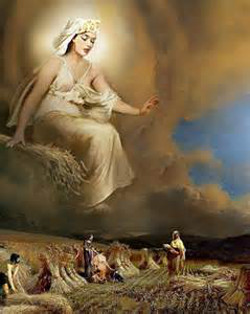 Read More
Read MoreShe is the Goddess of the Harvest, just as she once was on ancient Earth. On Arcadia, however, she has a monopoly on the food supply for the entire planet. The followers of Demeter are all a part of the great circle of the harvest. She has gifted her daughters with the ability to accelerate the growth of plants, while the Sons of the Earth reap the harvest. It is an endless cycle of planting, growth, harvest and celebration.
Her followers love dancing and singing, and value living at peace with nature. Elyusians (as the followers of Demeter are named after her sacred temple on ancient Earth) live in small villages centered around stone circles found scattered across the Plain of Demeter.
Families in Elyusia are matriarchal and young people are encouraged to seek potential spouses during the monthly bonfire in honor of Demeter. Formal education is not considered a necessity by Elyusians.
On the first full moon of each month her followers celebrate life and promote fertility around the Bonfire of Demeter.
HERMES
God of Travelers & Theives
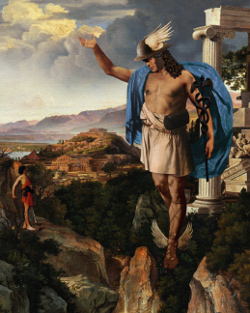 Read More
Read MoreHis followers were the wanderers of Arcadia until the Son of Ares convinced them to steal from their neighbors and build a fortress city called Metropolis.
Hermes himself is a care free playboy who spends his days and nights enjoying life, thus earning his reputation for seducing the women of Arcadia.
Followers of Hermes don’t like to be tied down to any single profession. They practice whatever trade is needed for survival at that moment, and are not opposed to trying new things or learning new skills. They love music, wide-open spaces and travelling. Most Hermians live in extended families with their parents, siblings, aunts, uncles and cousins. These large families share the burdens of daily life and all live in the same caravan ship under the rule of a Patron.
Families among the followers of Hermes are patriarchal and fathers arrange the marriages for their children. Education is a family matter, where young people gain the skills necessary for adulthood from fathers, mothers, uncles and aunts.
(Nota Bene: Since the Hermians settled in Metropolis and began living in houses and using the caravan ships for raiding, the dynamics of family life have begun to change.)
HEPHAESTUS
God of the Forge
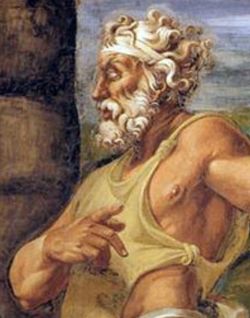 Read More
Read MoreThe human followers of Hephaestus are highly skilled engineers, geologists and miners. They tend to be introverts who prefer the familiarity and security of their dark and mysterious underground capital, Erebus.
The automatons created in Hephaestus’ workshop outnumber the human population 10 to 1 and compose a highly obedient servant class for their human masters. Rather than families, followers of Hephaestus are part of larger groups called clans.
Each clan had a monopoly on a type of trade and provide all the education and training necessary for children born into the clan. If a young person show potential in a specific skill, it is possible for them to be adopted into a different clan.
ARTEMIS
Goddess of the Hunt
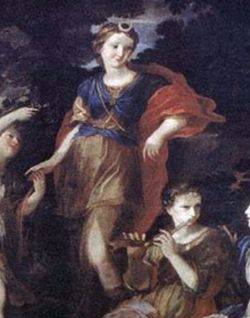 Read More
Read MoreOn ancient Earth, she was strongly associated with the moon. Both she and her twin brother, Apollo, are also gifted archers.
Due to an unfortunate tragedy, there are currently only a few dozen followers of Artemis on Arcadia, and the Artemis herself lies dormant. In the past, the Huntresses of Artemis were known to be independent, fun-loving, singers and of course the best hunters on the planet. The new followers come from many different sects and have no clearly defined group traits yet, except their calling to worship and revive the sleeping Goddess Artemis.
APOLLO
God of Healing, & Music
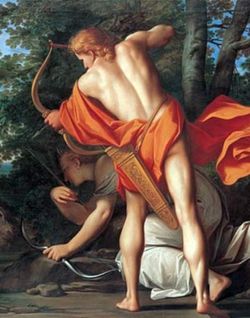 Read More
Read MoreOn ancient Earth, he was strongly associated with the sun. Both he and his twin sister, Artemis, are also gifted archers.
When his sister fell into an eternal slumber, Apollo, in his grief, chose to join her. In spite of this, his followers continue to carry on much the same as they did before.
Many of the followers of Apollo are healers and scientists. Some are also called to be authors, poets and artists. They enjoy painting, poetry, biology and music. The city of Heliopolis is filled with sculpture gardens, art galleries and studios. Followers of Apollo spend at least part of each day engaged in either the arts or the sciences and most spend at least some of their lives among the followers of another sect as part of their training.
Families among the followers of Apollo are patriarchal and fathers arrange the marriages for their children. All followers of Apollo are given basic training in both the arts and the sciences, but must choose their path by age 13.
HESTIA
Goddess of the Hearth
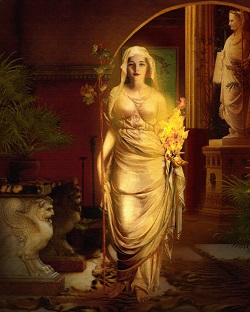 Read More
Read MoreOn ancient Earth, Hestia was known as the protector of the Hearth, or the central fireplace of the home. Her followers were virgins who tended to a sacred eternal fire kept within her temples.
She is also known to have given up her place on Mount Olympus to make room from the youngest god, Dionysus.
She has no direct followers on Arcadia, though everyone views her with the highest respect and gratitude, because she is responsible for preventing the more chaotic Olympians (Zeus, Hades, and Ares) from spoiling this new paradise.
DIONYSUS
God of Wine and Mirth
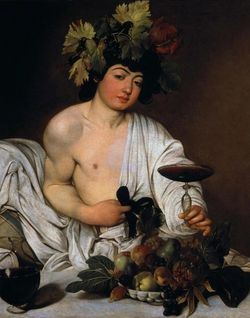 Read More
Read MoreThe followers of Dionysus live for the moment. They are boisterous, outgoing and generally happy people. Chefs in the Dionysian capital of Vegas are the most skilled in all of Arcadia because their ability to create new and different flavors is highly prized.
The theatre school of Dionysus trains singers, dancers and actors. The entertainment industry is the primary focus of most followers of Dionysus, either providing hospitality to the many visitors to Vegas or exporting concerts or live theatre to the other sects. Stable, structured families are rare in Vegas, although individuals seeking such arrangements are allowed and even encouraged to marry followers of Aphrodite.
A basic education is provided for all children, although the theatre school is the only formal training institution in Vegas.
ZEUS & HADES
Gods of Power & Death
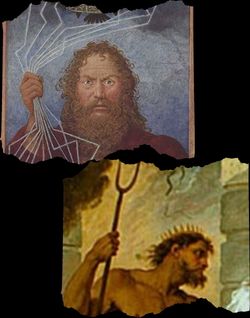 Read More
Read MoreThanks to Hestia, these gods have been prevented from influiencing Arcadia, though on Earth they held incredible power.
ARES
God of War
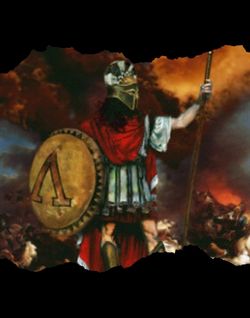 Read More
Read MoreThanks to Hestia, Ares has nowhere near as much power in Arcadia as he did on Earth.
Fortunately for Ares, nothing is perfect. Once every hundred years the Son of Ares is born to upset the delicate of the world and bring chaos to Arcadia.